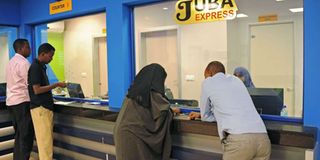Premium
Somalia in serious economic slump as Covid-19 takes its toll

What you need to know:
- Finance Minister Abdirahman Dualeh Beileh said the pandemic has harmed remittances from abroad and local businesses, meaning targets will not be met.
- The minister did not give specific figures regarding the overall projected budget but said Somalia is experiencing an economic slowdown.
- The country is among poor nations expected to benefit from the World Bank’s $14 billion package for emergency credit to companiesand response to the pandemic.
Mogadishu,
Somalia’s economy is facing a serious setback of low revenue collections owing to the novel coronavirus.
In his monthly press briefings, Finance Minister Abdirahman Dualeh Beileh said the pandemic has harmed remittances from abroad and local businesses, meaning targets will not be met.
The minister did not give specific figures regarding the overall projected budget but said Somalia is experiencing an economic slowdown.
Dr Beileh also said revenue from ports and airports has decreased as a result of diminished activities.
“Tax collection by the ministry is at its lowest,” he said. “Our budget projection for this year is already suffering from a $70 million shortage.”
Somalia and many other African countries were among the last to record cases of Covid-19 but since March, when the first case was confirmed, the number of incidents has been increasing.
By Saturday evening, the country had recorded 3,038 cases including 92 deaths and 1,209 recoveries.
FINANCIAL AID
The country relies on diaspora remittances to finance about a third of the economy.
The World Bank estimates that remittances to Somalia amount to about $1.3 billion annually, which is more than all the humanitarian or development assistance the country receives.
Dr Beileh said the government is bound to request its partners’ to bridge the gap in the budget.
“A well balanced budget is needed for the government to deliver services to the public as well as tackle the Covid-19 epidemic,” he said.
WORLD BANK
Mogadishu had already dedicated $5 million to shielding the economy from the spread of the virus.
The country is among poor nations expected to benefit from the World Bank’s $14 billion package for emergency credit to companies and response to the pandemic.
The minister projected that economic growth will resume once the effects of the virus are dealt with. He did not give a forecast.
Somalia is already facing food shortage prospects this year as locusts have attacked the Horn of Africa.





